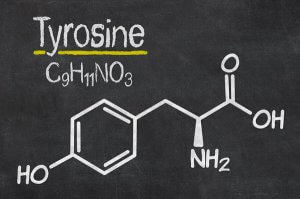Table of Contents
Key Takeaways
- Tyrosine boosts working memory, executive function, and creativity.
- It aids in stress reduction, mood improvement, and anxiety alleviation.
- Tyrosine lessens symptoms of ADHD.
- L-Tyrosine is a crucial precursor for catecholamine neurotransmitters.
- In a hurry – click here to learn more about getting an effective dose of L-Tyrosine in: Mind Lab Pro®
L-Tyrosine is the master precursor required to form all catecholamine neurotransmitters.
Your brain uses the enzyme tyrosine hydroxylase to convert L-Tyrosine into L-DOPA. Decarboxylation of L-DOPA results in synthesis of the neurotransmitter dopamine.[i]
Once converted into dopamine, the enzyme dopamine-beta-hydroxylase converts L-DOPA into norepinephrine (noradrenaline).
And Phenylethanolamine n-methyltransferase converts norepinephrine into epinephrine (adrenaline).
This triad of neurotransmitters are collectively known as “catecholamines”.
Tyrosine can be a highly effective nootropic for boosting cognitive function. And is particularly helpful in maintaining cognitive performance when you’re under practically any kind of stress. Including music played above 90 dB’s.
L-Tyrosine works in synergy with stimulants like methylphenidate (i.e. Ritalin).[ii] Drugs like Ritalin work by blocking the reuptake of the neurotransmitters dopamine, and norepinephrine. And if there’s not enough dopamine available to do the job, Ritalin doesn’t work very well. L-Tyrosine potentiates increases in extracellular dopamine.
L-Tyrosine also stimulates the production of thyroid hormones T3 (triiodothyronine) and T4 (thyroxine) which are crucial in maintaining both overall physical and cognitive health.
L-Tyrosine can boost libido, memory, focus, concentration, mood, offers anti-depressant effects, and improves executive function in those with ADHD.
Tyrosine helps:
- Cognitive Stress. L-Tyrosine produces the catecholamine-triad of neurotransmitters dopamine, norepinephrine, and epinephrine. Sleep deprivation and extreme stressors like heat and cold can deplete catecholamine levels. L-Tyrosine restores them to preserve optimal cognition.[iii]
- Neurotransmitters. L-Tyrosine is a required precursor for dopamine, norepinephrine, and epinephrine. As your dopamine levels increase, you’re better able to concentrate, organize your thoughts, and stay productive.
- Attention Deficit Disorder (ADHD). L-Tyrosine can be an effective treatment for ADHD symptoms. It works in synergy with pharmaceutical drugs like Ritalin and Adderall by boosting extracellular levels of dopamine. Helping these drugs be more effective. And mitigating side effects like crashes when the drug wears off.
Overview
Your brain converts L-Tyrosine to L-DOPA which then produces the neurotransmitter dopamine. The unused dopamine is then further converted into the neurotransmitters norepinephrine (noradrenaline) and epinephrine (adrenaline). This triad of neurotransmitters are collectively referred to as “catecholamines”.
 “Tyrosine” is derived from the Greek word tyros, meaning cheese. It was first discovered by German chemist Justus von Liebig in 1846 in the protein casein from cheese.
“Tyrosine” is derived from the Greek word tyros, meaning cheese. It was first discovered by German chemist Justus von Liebig in 1846 in the protein casein from cheese.
Tyrosine is considered a non-essential amino acid because it can be synthesized in your body from phenylalanine. Which is found in many high-protein foods such as poultry, fish, dairy, nuts, soy products, lima beans, avocados and bananas.
L-Tyrosine amino acid supplementation enhances working memory and executive function in the prefrontal cortex. It helps with creative flow states, is fuel for inspiration, cognitive flexibility, and the kind of “convergent thinking” you do in multiple choice exams.
L-Tyrosine assists in the production of thyroid hormones T3 (triiodothyronine) and T4 (thyroxine) which are crucial in maintaining both overall physical and cognitive health.
L-Tyrosine vs N-Acetyl L-Tyrosine (NALT): What’s the Difference?
N-Acetyl L-Tyrosine (NALT) is the amino acid L-Tyrosine with an acetyl group added. When you take NALT as a supplement, it breaks down in your kidneys back into L-Tyrosine. So in theory, the two supplements offer the same benefits.
There is some debate in the nootropics community on which is more effective. NALT or plain L-Tyrosine. NALT is a more soluble form of L-Tyrosine so it should be more bioavailable to your body.
However, some studies report that in some cases, a sizeable percentage of supplemental NALT is excreted in urine before it’s converted into L-Tyrosine.[iv]
On a personal note, I haven’t had any issues using NALT as a source of L-Tyrosine. It gives me a dopamine and adrenal boost you’d expect from supplementing with a dopamine precursor.
But when I haven’t any NALT around I successfully switch to L-Tyrosine although at a slightly higher dose.
When dealing with ADHD/ADD, L-Tyrosine is particularly effective when stacked with ALCAR (Acetyl-L-Carnitine). ALCAR easily crosses the blood-brain barrier for boosting acetylcholine levels. And seems to positively influence serotonin levels. And Tyrosine provides my brain with the dopamine it needs to mitigate symptoms of ADHD/ADD.
I find that L-Tyrosine stacked with 20 mg of Ritalin twice a day works particularly well. Clearly, this brain doesn’t have the capacity to produce enough dopamine on its own. And needs the boost that comes from supplementing with Tyrosine.
So like all nootropics, YMMV. Always take into account how each nootropic works synergistically with others in your stack. And how they work with any meds you need to take.
This is as much art as it is science. And experimentation is key for optimal cognition.
How does L-Tyrosine work in the Brain?
L-Tyrosine boosts brain health and function in several ways. But two in particular stand out.
- L-Tyrosine improves memory and cognition under acute stress. Acute stress is defined as short-term stressors that can affect cognition. Examples are extreme heat or cold. Things like cold showers, extreme sports, car accidents, relationship problems, intense movies, business deals gone awry, exams and war zones.
In one study done at the University of Bedfordshire in the UK, the effect of L-Tyrosine on cognitive performance was measured before an exercise task.
Researchers recruited 8 soccer players. And had them complete a 90-minute soccer simulation performance test in an environmental chamber set at 77 degrees Fahrenheit.
The soccer players were given either L-Tyrosine before exercise or a placebo. Cognitive performance was measured before the exercise task. Then again at “half-time”, following half time, and following the entire simulation.
The cognitive performance task assessed dual-task and vigilance. The outcome revealed that cognitive vigilance and reaction time among soccer players significantly improved following administration of L-Tyrosine.
Results showed that in warm-weather conditions, L-Tyrosine could enhance cognitive function and prevent cognitive impairment during exposure to exercise-heat stress.[v]
- L-Tyrosine boosts neurotransmitters. L-Tyrosine taken as a supplement converts into the neurotransmitter dopamine. Dopamine helps control movement in your body, is fundamental to memory, attention and problem solving.
The unused dopamine can then convert into the neurotransmitters norepinephrine (noradrenaline) and epinephrine (adrenaline).
Norepinephrine is important for attentiveness, emotions, sleeping, dreaming and learning.
Epinephrine drives your ‘flight-or-flight’ response. It’s what prompts your reaction to dangerous circumstances, emergency situations, or in stressful situations or environments.
In one study done in the Netherlands, researchers determined if L-Tyrosine would boost cognitive resources associated with cognitive control. They performed tests designed to measure “working memory” using the N-Back Test.
Study participants were assigned to engage in a “1-back” condition of easy difficulty and then a 2-back condition of tougher difficulty. Those that used L-Tyrosine demonstrated superior performance in the 2-back test, but not the 1-back test.
The study authors suggested that L-Tyrosine provides greater cognitive enhancement when cognitive demand increases. The bottom-line; supplementation of L-Tyrosine may help you increase your IQ score due to maximizing catecholamine reserves.[vi]
How things go bad
As we get older, our brain and body chemistry and energy metabolism changes.
 ↓ Dopaminergic neurons are damaged or die
↓ Dopaminergic neurons are damaged or die
↓ Neurotransmitter levels decline
↓ Thyroid hormones decline
↑ Stress levels increase
↓ Working memory and mood decline
All of these changes are often attributed to aging. But could be a result of dietary and lifestyle choices.
Unchecked, they could lead to neurodegenerative diseases like Parkinson’s, a drop-in quality of life and depression.
L-Tyrosine benefits
L-Tyrosine can boost levels of the neurotransmitters dopamine, norepinephrine, and epinephrine. And contributes to the production of thyroid hormones T4 and T3.
Tyrosine can help boost cognition especially in stressful situations. It helps improve decision making, ‘flow state’ and creativity, cognitive flexibility, and working memory.
L-Tyrosine converts into L-DOPA to produce dopamine. L-DOPA is also used to make melanin in your body. This conversion process helps in the removal of neurotoxic quinones. And chelates heavy metals like mercury and lead which can accumulate in and damage neurons.
The dopamine that is not used by your brain is available to produce norepinephrine (noradrenaline) which is important for attentiveness, emotions, sleeping, dreaming, and learning.
L-Tyrosine can be an effective nootropic when stacked with ADHD/ADD meds like Ritalin or Adderall. It helps supply extracellular dopamine needed to improve the effectiveness of stimulants used to boost the uptake of dopamine in your brain.
How does L-Tyrosine as a nootropic feel?
Keep in mind that L-Tyrosine is a precursor to catecholamines. So if you’re not ‘low’ on dopamine, norepinephrine or epinephrine – you may not ‘feel’ anything.
 Many neurohackers report a lift in mood, better focus, concentration, increased energy, and an overall sense of well-being. L-Tyrosine can help readjust your motivation levels. It can help lower anxiety levels, especially social anxiety.
Many neurohackers report a lift in mood, better focus, concentration, increased energy, and an overall sense of well-being. L-Tyrosine can help readjust your motivation levels. It can help lower anxiety levels, especially social anxiety.
Supplementing with L-Tyrosine can help bring your blood pressure down if its elevated from a stressful situation or environment. Take it before the stressful event if you can.
L-Tyrosine helps buffer the effects of stimulants like caffeine or amphetamines. It helps potentiate and prolong the effects of Ritalin or Adderall, and reduces the crash.
If you’re into athletics or do manual work, you’ll find that supplementing with L-Tyrosine before a workout or construction job will leave you feeling great afterwards. It helps mitigate many of the effects of acute stress caused by short-term stressors.
And L-Tyrosine helps your body to produce melanin, so you may find it easier to get a tan while at the beach.
L-Tyrosine Research
L-Tyrosine to treat ADHD
Several studies have investigated using L-Tyrosine for the treatment of attention deficit hyperactivity disorder (ADHD). One informal study published in the 1980’s determined that L-Tyrosine resulted in short-term relief from ADHD symptoms. But subjects eventually reached tolerance and a diminished effect.
This is important for neurohackers to keep in mind. It seems that L-Tyrosine on its own can benefit some more than others. Regardless if you’re treating ADHD, or are perfectly cognitively healthy.
I’ve seen more than one report of nootropic users experiencing tolerance after just a week of supplementing with L-Tyrosine. But most peer-reviewed, published studies show positive results.
One study published in Neuropsychiatric Disease and Treatment in 2011 looked at using amino acid precursors for the treatment of deficit hyperactivity disorder (ADHD). Including L-Tyrosine for dopamine, and 5-HTP for serotonin.
The study used 85 young people aged 4 – 18 years old, all with a clinical diagnosis of ADHD. They were treated for an initial period of 8 – 10 weeks.
Urinary samples to determine serotonin and dopamine levels were collected within the first 4 weeks. If they didn’t reach adequate levels, subjects were moved to higher dosing levels 2 and then 3 until they got relief from symptoms.
Researchers found that the dopamine and serotonin precursors yielded similar results to Strattera and Ritalin. And “the amino acid protocol may be equal in efficacy to potent, pharmaceutical ADHD medications”.[vii]
L-Tyrosine reduces blood pressure under stress
This study is particularly interesting for its nootropic application. It’s commonly understood that blood pressure rises when we’re under stress. The source of stress doesn’t really matter. Stress up = blood pressure up.
A study in Amsterdam showed that L-Tyrosine administration decreased blood pressure about 15 minutes after ingestion. This study involved assessing task performance following acute stress.
Acute stress is usually short-term and can be caused by driving, fighting, athletics, martial arts training, war, combat training, CrossFit, cold showers, loud music, intense movies, loud noises, business deals, relationships, school, exams and more.
The point is, this study is applicable to every one of us. The study found that L-Tyrosine reduced diastolic blood pressure within 15 minutes of taking the supplement. And blood pressure normalized within 1 hour.
This study tells us that L-Tyrosine may promote a decrease in blood pressure caused by stress. And could be used to mitigate the effects of stressful situations if taken prior to the stressful event.[viii]
L-Tyrosine promotes cognitive flexibility
Cognitive flexibility applies to those who can adjust their thinking quickly to adapt to novel situations and stimuli. A high degree of cognitive flexibility is associated with increased fluid intelligence, superior reading and comprehension, and a healthier brain.
Recent research (2015) supports the idea that L-Tyrosine promotes cognitive flexibility. In this trial, researchers recruited 22 adults. And setup a double-blind, placebo-controlled study.
All subjects were assigned a task switching procedure to measure their flexibility. The results showed that receiving L-Tyrosine supplementation increased cognitive flexibility compared to the placebo group.
The researchers determined that “L-Tyrosine can facilitate cognitive flexibility by repleting cognitive resources”.[ix]
The team observed that increased cognitive flexibility was likely due to a boost in dopamine concentrations. They noted that L-Tyrosine enhanced usage of various cognitive resources. And one way to increase your cognitive flexibility would be to start supplementing with L-Tyrosine.
It stands to reason that people who are close-minded, set it their ways, are resistant to change and can’t cope with unexpected stimuli or situations have “cognitive rigidity”. And it’s likely due to suboptimal dopamine levels.
L-Tyrosine Dosage
L-Tyrosine suggested dosage for cognitive benefit is 500 mg – 2 grams per day.
You may find your body responds to smaller doses. Or even more if you’re stacking it with stimulants like ADHD meds. Listen to your body and see how you react.
If you find you do not experience the full benefit from L-Tyrosine, then try using it an hour before or two hours after a meal. Because L-Tyrosine taken as a supplement may compete with other amino acids in food for transport into your system.
I personally stack L-Tyrosine with my Ritalin dose twice per day. And a final dose of L-Tyrosine late afternoon to prevent a stimulant crash.
NOTE: long-term use of L-Tyrosine can suppress serotonin. Symptoms include depression, fatigue or severe anxiety feeling much like a panic attack. You can easily counter this by supporting serotonin with a 250 – 500 mg L-Tryptophan about 60 mins. before bed.
L-Tyrosine Side Effects
L-Tyrosine is considered non-toxic and very safe. Most neurohackers and healthy human adults don’t have any negative side effects from using amino acid tyrosine as a nootropic supplement.
At higher doses there are reports of stomach issues and migraines. Migraine problems usually happen to those who already suffer from migraines. This may be an indication that your neurotransmitter levels are already optimal, and you don’t need to supplement with L-Tyrosine.
L-Tyrosine can increase your thyroid hormones. So if you’re hyperthyroid you should use caution when supplementing with L-Tyrosine because it may change the way your thyroid meds work.
And if you’re taking MAO inhibitors (MAOI’s) like selegiline, Azilect, Marplan or Nardil you should not use L-Tyrosine.
Monoamine oxidase inhibitors (MAOIs) work in your brain by blocking the enzyme monoamine oxidase. This enzyme normally blocks excess dopamine. But when you block the enzyme, more dopamine is released.
So using L-Tyrosine in combination with MAOI’s could raise dopamine levels too high. Resulting in a rapid rise in blood pressure (hypertensive crisis). Causing severe headache, nausea and sweating, severe anxiety, rapid heartbeat, chest pain, vision changes, shortness of breath and confusion.
A severe increase in blood pressure from this combo can lead to hemorrhagic stroke or a heart attack.
Where to buy L-Tyrosine
L-Tyrosine is available to buy in powder, capsule and tablet form. Capsules and tablets are usually 300 – 500 mg.
Some pre-made nootropic stacks and workout stacks also include L-Tyrosine as part of their formula.
N-Acetyl L-Tyrosine (NALT) is an alternative to plain L-Tyrosine. NALT has an acetyl group added to L-Tyrosine in an attempt to make it more bioavailable.
For example, Mind Lab Pro® contains 11 brain enhancing nootropic compounds including N-Acetyl L-Tyrosine.
I recommend Mind Lab Pro because it addresses all aspects of anxiety resistance, memory and cognitive enhancement, stabilizes mood, brain repair, and maintenance.
This premium nootropic stack is designed to affect neurotransmitters, cognitive energy, brain waves, neuroprotection, and regeneration. See my Mind Lab Pro review for a detailed report.
Ensure you read labels carefully and stick with manufacturers who follow Good Manufacturing Practices (GMP). And are GMP-Certified. And do your best to avoid toxic “other ingredients” which are usually listed at the bottom of “Supplement Facts” labels.
Nootropics Expert Recommendation
 L-Tyrosine 500 mg – 2 grams per day
L-Tyrosine 500 mg – 2 grams per day
I recommend using L-Tyrosine as a nootropic supplement.
Your body does synthesize some L-Tyrosine from phenylalanine which comes from high-protein foods like chicken, fish, almonds, avocados and bananas.
But most of us don’t get enough L-Tyrosine from our diet. So supplementation will help.
L-Tyrosine is helpful for most neurohackers to combat stress and sleep deprivation. It’ll boost dopamine, norepinephrine and epinephrine levels.
It’s particularly helpful if you take L-Tyrosine prior to a stressful situation, workout or physically demanding job.
L-Tyrosine is especially helpful to those dealing with ADHD/ADD. It’s a great compliment to stack with stimulant meds like Ritalin or Adderall. L-Tyrosine will provide the dopamine your brain needs. It will help smooth out and prolong the effects of stimulant meds. And help prevent the associated crash when they wear off.
A good stack for ADHD is using your usual med dose with L-Tyrosine 500 mg, Alpha GPC 300 mg, and ALCAR 500 mg. Which is should particularly effective if you are dealing with any phenylalanine abnormalities.
You can buy individual L-Tyrosine supplements. Or you could try my favorite pre-formulated nootropic stack Mind Lab Pro® which includes N-Acetyl L-Tyrosine (NALT).
Mind Lab Pro contains a synergistic blend of 11 brain enhancing nootropics covering all aspects of cognition and brain health. See my full Mind Lab Pro review for more.
You can safely use up to 2,000 mg per day when stacking with ADHD meds. But in smaller divided doses throughout your day.









Join The Discussion - 417 comments
Verduci
October 13, 2021
Hi David, if I take tyrosine every day but only in the morning, will there be a “build-up”?
Or even after three months of taking it, will its effect disappear after four hours?
So …… after 5 months of taking (only in the morning), I take tyrosine and my brother never took it, at 15:00 in the afternoon he and I, in the brain, have the same amount of dopamine?
So: is it necessary to take Tyrosine at least twice a day?
If I take it only in the morning is it almost useless?
Hello and thanks
David Tomen
October 13, 2021
Verduci, the half-life of L-Tyrosine means the supplement you take in the morning is used up by noon. And the L-Tyrosine you take at noon is gone by about 4 PM. It will not “build up” in your brain.
I wouldn’t call the Tyrosine you take in the morning “useless” because it’ll be making dopamine for a few hours. And your statement about your brother is true in a sense but chances are levels of dopamine in your brain and his will not be the same no matter how you look at it. Because of differences in chemistry, environment, your lifestyle, and what each of you are doing at that moment in time.
Brandon Green
October 3, 2021
Hello,
Great article. Would it be “advisable” to “cycle” L-Tysosine with perhaps Mucuna in order to prevent the “fast adaption” that you mention in the article (in as little as a week)? Also “long-term use” can cause a “crash” in Serotonin something I certainly do not need. What would you advise?
David Tomen
October 4, 2021
Brandon, you do not need to cycle Tyrosine or Mucuna. But there is no reason to be using Mucuna anyway unless you are dealing with Parkinson’s if all you want to do is increase dopamine.
Tyrosine will produce dopamine within a half hour of taking the supplement as long as the cofactors are present in your system including Vitamin B6, B9 & B12. But the Tyrosine you take at 8 AM is gone by noon and needs to taken again which will provide dopamine until around 4 PM. This amino acid has a short half life and is soon gone from your system.
Dopamine and serotonin must be in balance. So, if you are using Tyrosine long-term and at doses like 1,500 mg per day you need to use 500 mg L-Tryptophan before bed to raise serotonin. And keep it in balance with dopamine. If you skip this step you won’t experience a “crash” but you will feel the symptoms of low serotonin. Which usually looks like depression.
Jay
September 17, 2021
David, could you please recommend me some “capsule fillings machine size 00” from amazon or ebay? The one you use was removed from amazon unfortunately and I just bought the capsules but i dont have the fillings machine so I’m upset with my bad luck
– In the case of headaches caused by not sleeping enough hours (I work long hours and do not have enough time to sleep),
What nootropics would you recommend? (Citicoline and alpha gpc has not helped me)
David Tomen
September 18, 2021
Jay, there used to be lot more options on Amazon for Capsule Filling Machines but the only one there now is this one: https://amzn.to/3tPLizh. Click on the “more buying options” link on the right for the seller.
You will find a lot more options in eBay is you search for “100 Holes Capsule Machine Filler Size 00”. The type you want is the one displayed on Amazon. And here’s a tip. Get separated capsules which will shorten you capsule filling time.
If your headaches are caused by lack of sleep the only thing that will fix it is more sleep. You are going to have to find the time for sleep because that is how your body and brain repair itself. And long-term memories are encoded during REM sleep. No sleep and you’ll have poor memory.
Priya
August 26, 2021
I’ve been taking L-Tyrosine, NAC, Rhodiola, Mucuna Puriens (once or twice a week only), Phosphotylserine and Alpha GPC, after reading this site and it has an amazing impact on my life. I’m 33 female and was diagnosed ADD a year back. I was put on Stattera (Atomoxetine) but after 3 months of taking it I barely felt any different and so I quit it.
Taking these nootropic supplements has really improved the quality of my living helps me stay calm and interested in what I’m doing. I still get distracted and veer off track frequently and hardly get things done completely. I would like to try medication again – I doubt if I’ll be prescribed Ritalin as its rare in my country. Stattera is the drug of choice for ADD.
My question is can I add Stattera (Atomoxetine) to this Stack? L-Tyrosine and Mucuna has some interactions with anti-depressants but I’m not sure how it plays with Stattera.
David Tomen
August 26, 2021
Priya, first, if you are using L-Tyrosine which is preferred you do not need to use Mucuna Pruriens. Both of them make dopamine. But L-Tyrosine is safe and more predictable for using with ADD. Keep in mind that the L-Tyrosine you take in the morning is gone by noon and will no longer provide any benefit. For ADD it needs to be dose minimum twice per day: morning and noon.
The most basic ADD stack is L-Tyrosine, Alpha GPC, and ALCAR twice per day with or without Strattera. This will support the use of the stimulant. NAC and PC are also excellent additions to this ADD stack.
Atomoxetine prevents the reuptake of norepinephrine throughout your brain and inhibits the reuptake of dopamine in your prefrontal cortex. In other words it needs dopamine to do its job. You increase dopamine and norepinephrine with L-Tyrosine.
Priya
September 4, 2021
Thank you for the reply David.
I take Tyrosine 500 mg 3x a day like in your ADHD stack and its been the best change I ever did. It’s been brilliant. I ve been vegan most of my adult years and didn’t bother taking replacement vegan protein. I mustve suffered from Tyrosine deficiency during all those I lost to brain fog, lethargy and lack of motivation. I wish I had this information 10 years ago. 🙂
I have recently added Piracetam and Pterostilbene ( in the form of whole bark powder) after going through your other posts and planning to grow some lion’s mane at home. I feel much brighter now. I’ll be adding the Strattera soon.
Thank you so much for your generous help.
David Tomen
September 5, 2021
Priya, that is great news! Well done and good luck on your journey to wellness. It is stories like yours which encourages others that there is hope.
Amy Lo
August 12, 2021
Hi David,
Can I take tyrosine + B6 to boost my dopamine so that I can replace my sinemet 25 mg/100 mg? I have Parkinson‘s
David Tomen
August 12, 2021
Amy Lo, L-Tyrosine will not likely be enough for you. Most Parkinson’s patients use Mucuna Pruriens (L-DOPA) extract (95% – 99%). It is difficult to find a Mucuna Pruriens supplement that has that strong of an extract but they do exist. Like this one: https://amzn.to/3sk4zbm.
You are correct that it helps to use Vitamins B6, B9 & B12 which act as cofactors in the synthesis of dopamine.
Karolina
June 21, 2021
Hi, thank you for your article. I have a question, when I wanna treat myself just with tyrosine (don’t have any meds), can I use higher dosage? I have tablets per 500mg. And the second question, is it better to use it like a powder? (I can open the tablets and have a powder). I think it is absorbed faster.
Karolina
June 21, 2021
And more, what you would recommended with it for good treatment without meds (because I think I am undiagnosed ADHD).
David Tomen
June 21, 2021
Here is what is used for ADHD: https://nootropicsexpert.com/best-nootropics-for-adhd-add/
David Tomen
June 21, 2021
Karolina, recommended dosage of L-Tyrosine is 500 mg up to 2,000 mg per day. Depending on how much you need. But keep in mind that “more is not better”. Find the dose the works for you and stick with it.
Capsules are designed to disintegrate rapidly once you swallow them. You will not get more benefit by opening the capsule. If they are tablets however it may be better to crush them before use. It depends on how the tablet is made.
Ahmed
June 19, 2021
Hi David.
Which would you recommend, L-Tyrosine or L-Phenylalanine for lack of motivation/drive?
David Tomen
June 19, 2021
Ahmned, L-Tyrosine and you need to activate AMPA receptors as well for motivation. Dopamine in its own won’t do it. Explained here: https://nootropicsexpert.com/hacking-motivation-with-nootropics/
Ahmed
June 21, 2021
Hi again David.
Should Piracetam (it’s the only Racetam I can get my hands on) be enough for activating AMPA receptors along with L-Tyrosine?
David Tomen
June 21, 2021
Ahmed, Piracetam is fine for activating AMPA receptor. But pay close attention to dosage. And read what the studies say in my Piracetam review.
Kimberlee
May 23, 2021
What are the co-enzymatic factors that help to metabolize L-Tyrosine? I’m one of those who has suffered my entire life with this brain problem, and am just now honing in on some good answers.
David Tomen
May 24, 2021
Kimberlee, Tyrosine hydroxylase is the rate-limiting enzyme of catecholamine biosynthesis which uses tetrahydrobiopterin and molecular oxygen to convert tyrosine to L-DOPA. And then aromatic amino acid decarboxylase converts L-DOPA into dopamine (https://www.ncbi.nlm.nih.gov/pmc/articles/PMC3065393/).
Kimberlee
May 24, 2021
If my body has trouble metabolizing L-Tyrosine due to a possible Tyrosine Hydroxylase deficiency, wouldn’t supplementing with L-Tyrosine be useless? Is there a solution to this dynamic that you know of?
Thanks in advance for your thoughts.
David Tomen
May 25, 2021
Kimberlee, the only sure way to increase dopamine if you are dealing with a Tyrosine Hydroxylase deficiency is by using L-DOPA which you can get from Mucuna Pruriens extract. But that is assuming you aren’t suffering from an aromatic amino acid decarboxylase deficiency as well.